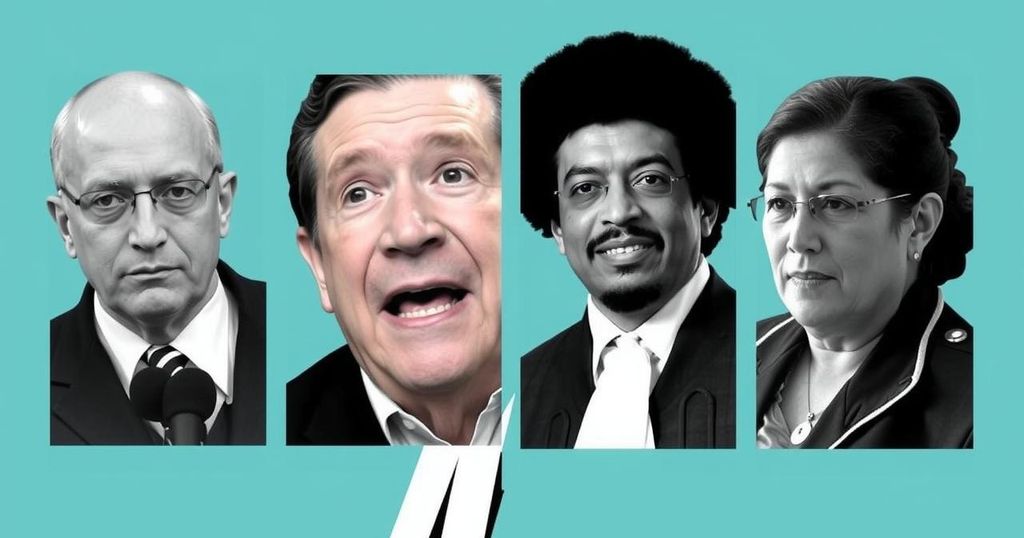Bolivia Faces Divisive Judicial Elections Amid Political Tensions and Voter Apathy

Bolivia is set to hold divisive judicial elections on Sunday, where subtle campaigning persists despite formal prohibitions. Voter disillusionment is prevalent, with many expressing indifference towards candidates. The elections come amidst significant political tension, including a controversial delay initiated by President Luis Arce. Experts warn that political meddling risks undermining the judiciary’s independence, echoing concerns in Latin America regarding the politicization of judicial systems, thereby challenging democratic integrity.
On the eve of Bolivia’s divisive judicial elections, scheduled for Sunday, a surge of subtle campaigning has emerged despite formal prohibitions. Faceless candidates have plastered their images on snack food packaging, while a few have embedded slogans in official voting materials, hinting at the desperate necessity of familiarity in an election where many voters grapple with an overwhelming array of choices. Bolivia retains the unique distinction of being the only nation to elect its supreme judicial figures, yet the electorate largely remains disenchanted and disillusioned with the process, likening it to a mere coin toss in decision-making. This sentiment echoes broader concerns over the integrity of judicial elections in Latin America, where experts assert that they often lead to political manipulation, compromising the judiciary’s independence and function.
The current electoral cycle comes in the wake of the Central Court’s controversial postponement, initiated by President Luis Arce, who sought to avert incurring the wrath of a divided political party while allowing his allies to retain significant influence over the courts. The Inter-American Court of Human Rights has voiced its apprehension regarding the implications of this postponement, warning it poses a risk to justice’s efficacy in Bolivia. This situation, described by former Minister of Justice Ivan Lima as disorderly, reflects the ongoing power struggle between Arce and Bolivia’s former President, Evo Morales.
As Bolivians prepare to cast their votes, only four of the nine positions on the Constitutional Court will be contested, with five judges remaining in place, raising pertinent questions about the legitimacy and efficacy of this exercise in democracy. Historical precedents indicate that turnout is likely to be low, with previous elections seeing widespread null and blank votes due to voter dissatisfaction and distrust regarding candidate selection. The upcoming elections promise to be a pivotal moment, not just for Bolivia’s judiciary but also for broader perceptions of judicial independence across Latin America, as Mexico awaits the outcome with significant interest.
Bolivia has established a precedent as the sole country conducting elections for its highest judicial offices, a practice aiming to democratize the judiciary. However, public sentiment reveals widespread dissatisfaction, with voters questioning the integrity and purpose of such elections. Critics argue that this system has led to a judiciary that serves political ends rather than the populace, compromising the fundamental democratic principles it was meant to uphold. Similar concerns about increased partisanship among judicial bodies have been voiced throughout Latin America, signaling a trend that threatens established judicial norms and the very foundations of democracy in the region. The backdrop of President Luis Arce’s controversial push for a delayed election, stemming from internal political tensions within the ruling party, further complicates the electoral landscape, raising alarms among national and international observers about the state of Bolivian justice.
The upcoming judicial elections in Bolivia encapsulate a significant moment for the nation’s democracy, as low voter engagement and political entanglement raise critical questions about the integrity of the electoral process. With public confidence eroded by previous elections and concerns about judicial independence in Latin America growing, the elections may serve as a litmus test for both Bolivia’s justice system and the broader political climate in the region. As Bolivia proceeds with this electoral exercise, it remains to be seen how the outcomes will impact the dynamics of power and justice in the country going forward.
Original Source: www.voanews.com







